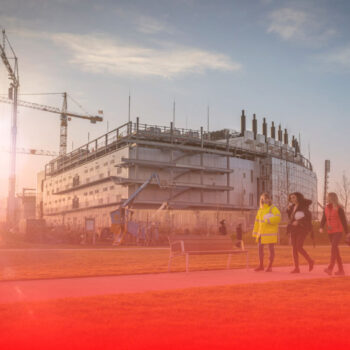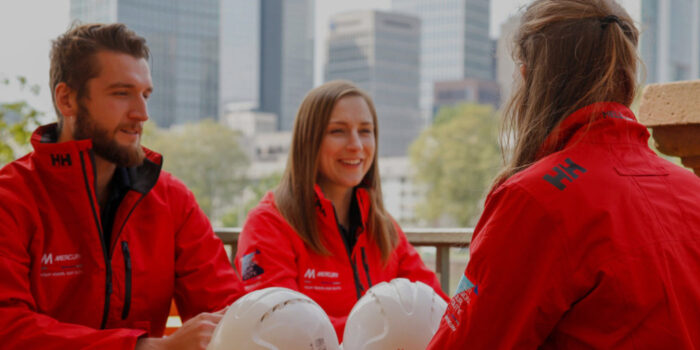Nachrichten und Einblicke

Insights: Delivering Data Centre Projects Across Europe
Recognising the benefits of working outside of your domestic market and entering Europe is fundamental to sustaining growth in the Data Centre market, writes Colm Burke.
The data centre market in Europe is expanding at an unprecedented speed. This growth has seen many Irish construction companies entering the European market as a result. While Mercury was one of the very first to do this, many Irish companies are now recognising the benefits of working outside of the domestic market in order to sustain high-growth and maintain a pipeline of projects.
Entering new markets
Before Mercury entered the European market, an extensive amount of research was first completed. In other words – we don’t put boots on the ground in any country unless we have carried out a thorough examination of the specifics of its culture and working environment. Our studies have included a thorough examination of industry & workplace culture, market conditions, growth forecasts, the legal & regulatory framework and more. Mercury has been strongly motivated by economic factors in terms of its focus on the European market in recent years.
As Europe’s technology hub, Dublin and its surrounding areas have long been a major centre for Data Centres in Europe, recently surpassing London to the number one spot with 25 per cent of Europe’s market share. However, approximately 70% of Europe’s data traffic is concentrated in Germany, France, Italy, Spain and the UK, with high growth now also seen in the Nordic countries. Therefore, it is entirely logical that experienced Irish contractors are increasingly working widely across the European continent.
Europe’s data centre construction market is expected to reach around $13 billion (11.5 billion euro) by 2024, growing at a compound annual growth rate (CAGR) of over 4% during 2018-2024. The main benefactor of this growth will be the countries in North-western Europe. Increased hyperscale investments from the large multinationals will increase the already high demand for a skilled workforce in several European countries including Ireland, Denmark, Germany, Sweden and the Netherlands. Much of this growth has been driven by GDPR regulations leading to greater cloud demand in Europe as well as Big Data and IoT, government support for data centre investment and a higher demand for colocation services.

The Irish Workforce
We have always been extremely fortunate in that the Irish workforce, perhaps more than any other, has long had the experience of working in other jurisdictions. While the domestic construction market has had its peaks and troughs over the years, there have always been opportunities for the supremely talented Irish construction workforce to work in markets such as Australia, New Zealand, Canada, the US as well as the UK and continental Europe. This has given us a unique ability to work as part of a multicultural team with a collaborative approach, to understand the workplace cultures of other markets and to encourage people during projects. This international outlook of many of our employees has been of enormous benefit to Mercury as we have expanded into new markets.
FDI & the transformation of Ireland’s construction culture
The long-standing partnership of many Irish construction firms such as Mercury, and some of the largely US-headquartered multinationals significantly raised the standards of Ireland’s safety & quality standards. This has undoubtedly given the Irish construction industry an edge in these competitive markets.
When multinationals first arrived in Ireland in the 1990s, Irish safety culture was very different. Working on projects in the 1980s, there was little expectation that workers would wear personal protective equipment (PPE). The culture could simply be described as ‘just getting on with the job’. If someone would fall, they’d often brush it off and hope nobody saw them for fear of embarrassment or ridicule. When many of the American multinationals entered the Irish market on large construction projects, they completely raised our bar on safety. What we ultimately learned from this was that when you give people the right safety tools and equipment, you get a lot more out of your people in terms of productivity and efficiency.
We have been sure to bring this culture along to every region in which we operate. It is important to sell the benefits of Ireland’s leading safety culture to your global workforce. Safety is not a stick to beat people up with – it is there to benefit them. When people begin understanding the benefits of robust safety policies, it makes an enormous difference. Construction will always be a comparatively dangerous business so this focus on safety makes people ultimately much happier to come into work. When people feel they are being looked after they work better – every time.

Workforce & Supply Chain considerations
In order to ensure success when entering new markets, we have been sure to embed our Mercury people within our international projects. While it is absolutely critical and essential that one also includes a large number of employees from the local community, you will always need a certain percentage of your own longstanding people in order to truly ‘make it happen’. This ensures you’re your organisational culture and policies & procedures become strongly embedded within all your global operations, as long-term employees will always want anything they do to be a major success.
With that said, Mercury have been sure to always engage with the local supply chain. It is not enough to say that as an Irish contractor, we’ll use an exclusively Irish supply chain. Naturally there are some challenges associated with this – the workforce speaks a multitude of different languages; every jurisdiction has varying regulations; and cultures regarding QEHS matters can different country to country. This however is mitigated by ensuring that we always train our people in Mercury’s procedures in safety & quality again and again and by understanding that no matter what jurisdiction we’re in, we must prioritise safety the same way. Your priorities may change depending on your project, but your values should always stay the same and once you have safety as a value, it will remain integral.
It’s important to contribute to the local economy by using the local workforce, tools, suppliers and materials. We have worked with some truly fantastic tradespeople across our European projects using local sub-contractors. When people see the benefit of your projects to their local economy and the opportunities that they create, it generates an enormous amount of goodwill from the local communities that you work alongside.
Irish construction companies have long had a great relationship with suppliers across Europe, and even on our Irish projects, a large amount of our supply chain has always gone through Europe, so this has been one of the easiest elements of entering the European market. Of course, for certain supply chain aspects, particularly CSA elements, there are requirements for using a local supply chain, such as using engaging with the local quarries. This has not been an issue for us in any of the markets we’ve worked in to date.
Conclusion
Mercury have been successful in being able to work within the cultural parameters of every jurisdiction that we work in. What you should hopefully end up with is a hybrid culture comprising what you bring from Ireland and the local culture of the jurisdiction you’re operating in. You have to be able to adapt to work with other people and understand what makes people tick. That’s the key to understanding culture and working in new markets across Europe.
Similarly, in order to succeed abroad, one must be prepared to do the research prior to putting boots on the ground in any new jurisdiction. Once you have all the correct data and a willingness to work with openness, paying strong attention to culture factors, the rest is easy.
Data Centres
Mercury is Europe’s most experienced Hyperscale and Enterprise Data Centre service provider. We go beyond to consistently meet the challenges of the ever-growing Data Centre market. Mercury’s highly skilled internationally mobile project teams have successfully delivered Data Centres for over 20 years for some of the world’s largest tech companies and a large number of enterprise clients. Our relentless dedication uniquely positions us to provide a highly complex and specialised turnkey service. From design & build, planning, construction right through to commissioning, we ensure safety & quality, innovation and value engineering every time.


